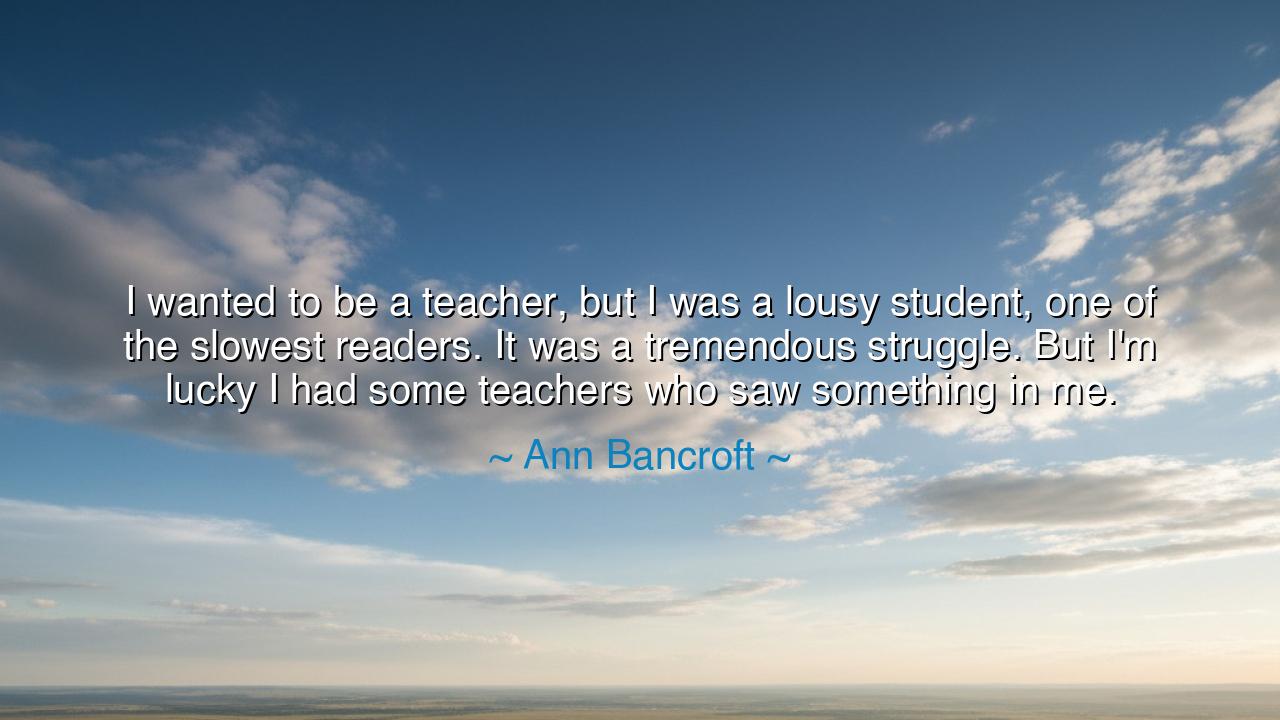
I wanted to be a teacher, but I was a lousy student, one of the
I wanted to be a teacher, but I was a lousy student, one of the slowest readers. It was a tremendous struggle. But I'm lucky I had some teachers who saw something in me.






Hearken, children of the ages, to the words of Ann Bancroft, who spoke across the chasms of struggle and triumph: "I wanted to be a teacher, but I was a lousy student, one of the slowest readers. It was a tremendous struggle. But I'm lucky I had some teachers who saw something in me." In these words lies a profound meditation on the duality of human endeavor—the tension between personal limitations and the transformative power of mentorship. Though the path may appear fraught with obstacles, the guidance of a perceptive soul can illuminate the darkened corridors of learning and purpose.
Bancroft’s admission of being a slow reader, a student who faltered, reveals the universality of human imperfection. To stumble in the pursuit of knowledge is not shameful; it is the very soil in which resilience and perseverance take root. Consider the tale of Thomas Edison, whose teachers declared him “unteachable” and whose mother became his first guide in learning. It was not innate brilliance alone but the patient nurturing of curiosity and the recognition of potential that forged Edison’s luminous legacy. Likewise, Bancroft’s story tells us that even in apparent weakness, the seed of greatness may quietly dwell.
Yet the heart of her reflection beats strongest in the recognition of the teachers who saw something in her. In the ancient scrolls of wisdom, we find repeated testament to the transformative power of those who perceive hidden potential. Plato himself chronicled the bond between Socrates and his disciples, a union wherein insight and faith in the student’s spirit surpassed mere measures of ability or speed. Such mentors do not judge by superficial metrics; they discern the latent spark that, once fanned, can blaze with creativity, courage, and understanding.
Bancroft’s journey also illuminates the paradox of aspiration: to be a teacher is to illuminate the path for others, yet her own path was wrought with struggle. Herein lies a universal lesson: the act of guiding others is often rooted in the empathy borne of our struggles. The teacher who has walked through difficulty sees with clarity the hurdles before the pupil and offers aid that is not mechanical, but soulful, attentive, and enduring. In this, Bancroft mirrors the great mentors of history who, having stumbled themselves, become beacons for those who follow.
Let us recall the story of Helen Keller, who, blind and deaf from infancy, might have languished in silence had it not been for her teacher, Anne Sullivan, who perceived the hidden channels of understanding within her. Sullivan’s patience, faith, and unwavering belief in Keller’s potential reflect precisely the teachers Bancroft remembered—those who recognize worth where others see only struggle. It is through such relationships that the human spirit, even in its slowest or weakest moments, can rise to extraordinary heights.
From this, a practical teaching emerges: seek mentors, and be a mentor. Recognize the latent potential in those who struggle, and do not judge worth by speed or early success. For within the tremendous struggle may dwell a spirit that, once encouraged, can move mountains. Likewise, when you confront your own limitations, remember that the eyes of a patient teacher—or a wise friend—may see your hidden strengths, even when you cannot.
Bancroft’s words whisper also a call to courage: embrace your struggle, own your slow progress, and yet hold fast to the dreams that stir your heart. As a teacher of the self and a student of life, understand that mastery is seldom immediate; it is forged in the fires of persistence, humility, and the guidance of others. Let her tale inspire you to persevere, to honor those who see your potential, and to offer the same vision to those who stumble beside you.
And so, let the generations hear this teaching: a slow reader, a faltering student, a soul beset by challenge, may yet rise to guide, to inspire, and to create. The true measure of greatness is not the absence of struggle, but the courage to continue and the grace to honor those who illuminate the path when darkness seems unending. In the echo of Bancroft’s reflection, may all who listen find patience, gratitude, and the enduring faith in the unseen gifts within themselves and others.






AAdministratorAdministrator
Welcome, honored guests. Please leave a comment, we will respond soon